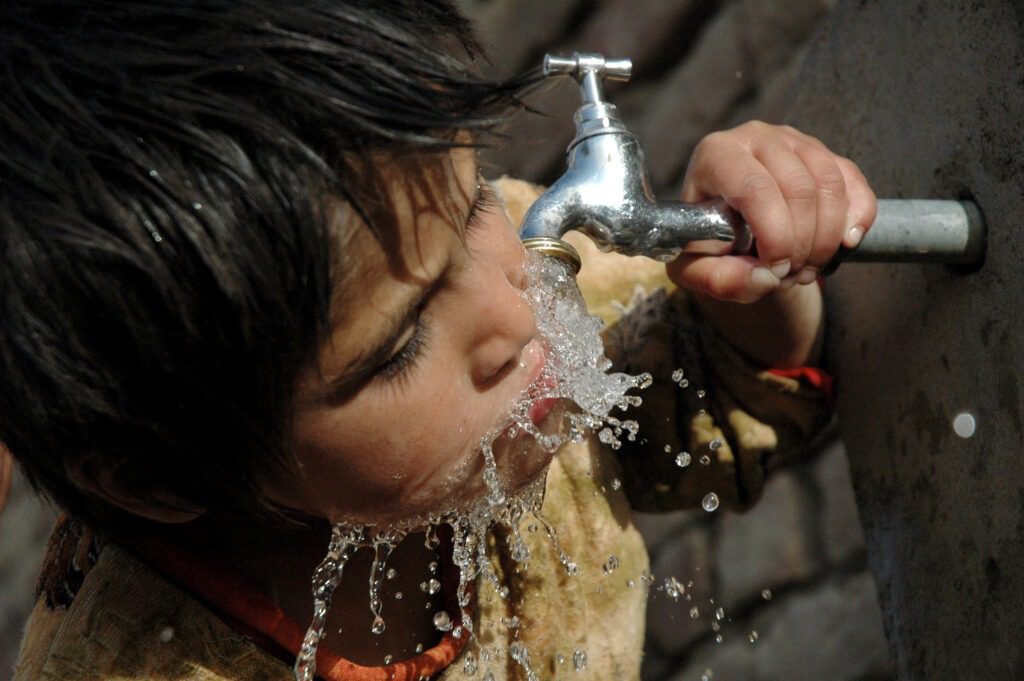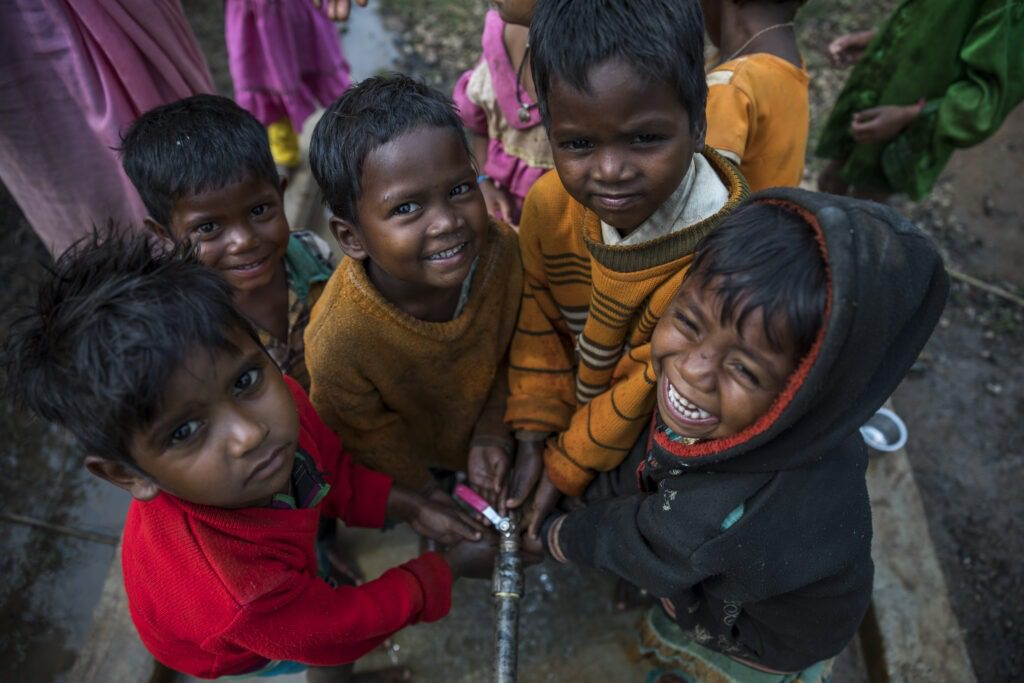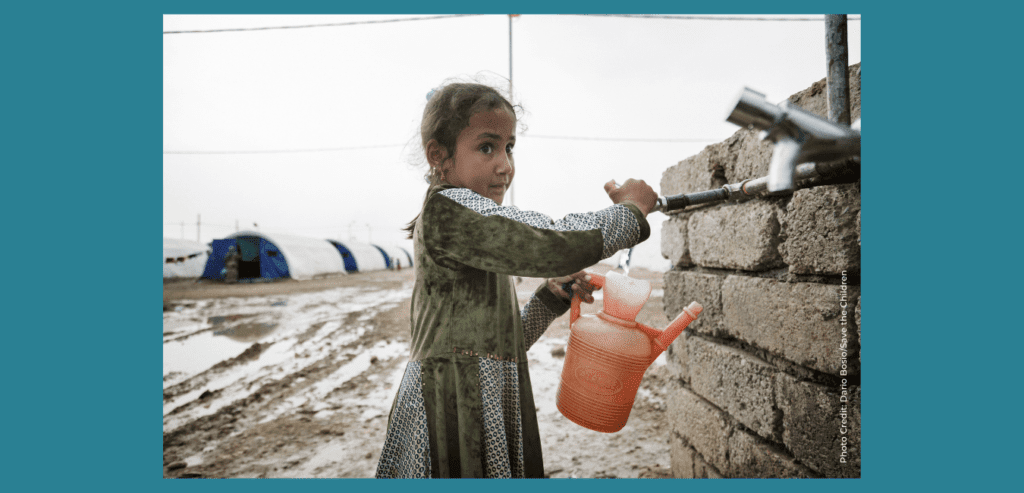Author: Sheridan Bartlett
The Global Alliance – Cities4Children has recently published an evidence-to-action brief on urban children and WASH (Water, Sanitation and Hygiene). This blog highlights some of the key ways NGOs can support the design and delivery of programmes designed to address WASH provision in urban areas.
Well over half of urban children in the global South, far more than officially recognized, live with levels of WASH provision that sabotage their health, safety, comfort, dignity and long term development. The situation in many slums and informal settlements could fairly be said to constitute a chronic humanitarian crisis, regularly meeting or exceeding the emergency thresholds applied in the context of disaster. This remains one of the most significant manifestations of urban disparity.
Shortfalls in urban WASH provision
The Sustainable Development Goals aim to achieve universal access to safe, affordable drinking water, sanitation and hygiene (WASH) by 2030. We are falling far short of meeting that mark. Globally, one person in four still lacks safe drinking water, almost half lack safely managed sanitation, and a third lack the means for maintaining proper hygiene at home.
In urban areas the situation is especially daunting, given rapid population growth in crowded, hard to serve informal settlements. The WHO and Unicef estimate that to reach universal coverage, urban progress needs to be five times faster than it is now. For safe urban drinking water alone, it needs to be an astonishing 25 times faster.

Child drinking from a water-pipe in Nepal. Credit: World Bank
Implications for urban children
The impacts of poor WASH provision are especially problematic for young children and their caregivers. Contaminated water supplies are responsible for most of the diarrheal diseases that still cause 20 percent of all under-five deaths each year. Worms and other parasites affect school-aged children as well, often more than half the children in a settlement. A lethal effect of poor WASH is its contribution to children’s malnutrition, which results not only from too little food, but from chronic low-level inflammation related to unsanitary surroundings. This, in turn, makes children more vulnerable to other infections and can sabotage their long-term health and development. The situation is complicated by the critical drain on caregivers’ time and energy imposed by inadequate provision.
The gender dimensions of poor WASH extend also to adolescent girls, who struggle, for instance, with dignified menstrual management. The absence of facilities at school means absenteeism and higher drop out rates for many girls. Harassment and violence can also be constant threats for girls who have to use toilets at a distance from their homes.
Radha’s story
Radha lives in a small Bengalaru slum. The only formal WASH provision is one water tap with supplies for a few hours every other day. The eldest of five, Radha dropped out of school to care for her siblings while her mother works. She cooks, cleans and washes clothes with water that she lugs home in heavy pots, often after waiting for hours at the tap, and throws waste in back lanes. What really bothers her, though, is the lack of a proper toilet. Her family dug a pit latrine, but had to give up using it because they could not afford to have the over-flowing pit emptied. Radha climbs through a hole in the boundary fence early in the morning to relieve herself. During monsoon, when there is more foliage, this feels quite private, but snakes are a problem. In the dryer months, she feels humiliated by being seen as she squats. It is especially hard when she menstruates and has to find discreet ways to dispose of her used pads. Men and boys loiter around, and she is frequently teased and harassed.[i]
What NGOs can do
NGO responses to such WASH-related needs as hygiene education, healthcare or nutritional supplementation, critical as they are, cannot take the place of inclusive, affordable city-wide responses to the provision of safe water and sanitation, which are primarily the responsibility of local government and its agents (including the private sector). Instead of being framed as an alternative to government action, this brief recommends that NGO contributions be developed as supplements or supports to on-going efforts to achieve universal provision.
In settlements challenged by density, informality and a lack of infrastructure, there is compelling evidence for the value of collaboration between communities and local authorities. Sometimes this takes the form of more general slum upgrading. The value of this kind of co-production is evident, for instance, in the work of Slum Dwellers International in hundreds of cities, and in the classic case of Pakistan’s Orangi Pilot Project, where resident-installed water and sewer pipes were hooked up to the city’s trunk infrastructure. In this way, NGOs can provide invaluable support to communities and their networks.

Children wash hands at a stand post installed in a Primary school at Kapoti Village in Karanjiya, Dhindori, Madhya Pradesh, India, february 2019. Credit: India water Portal/Prashanth Vishwanathan
Child-focused NGOs can play an especially critical role, since community networks and local authorities are seldom oriented to the specific needs of children and adolescents.
How NGOs can support WASH provision
- Supporting coproduction: Coordinate with community-based networks to press for local authorities’ engagement in equitable WASH provision, stressing the added value for children, and the implications for children’s rights.
- Data: Ensure that local WASH-related assessments and data collection include child-specific data that can inform well-targeted interventions.
- Children’s perspectives: In community-driven responses to upgrading, support the inclusion of caregivers’, children’s and adolescents’ perspectives in identifying problems and objectives.
- Complementary initiatives: Introduce initiatives within their specific expertise that supplement and strengthen the efforts towards universal WASH provision – including hygiene supports, safe play space, responses to the safety of adolescent girls, attention to provision in nearby schools and day care centres, and nutritional supports to speed the catch-up growth of children left malnourished by the chronic low levels of infection that can accompany contaminated surroundings.
- Advocacy and communication: On the national and international fronts, ensure a recognition of the linkages between WASH and children’s well-being, as well as the importance of locally-specific WASH efforts in ensuring their relevance to local children.
Read more about improving WASH provision for urban children here.
About the author
Dr Sheridan Bartlett is a distinguished researcher and author who works primarily on issues of urban poverty affecting children in low-income countries, bridging the gap between the work of child-focused agencies and the broader development agenda.
Endnotes
[i] Nallari, Anupama, “All we want are toilets inside our homes!”: The critical role of sanitation in the lives of urban poor adolescent girls in Bengaluru, India. Environment and Urbanization. 2015;27(1):73-88. doi:10.1177/0956247814563514
This work is licensed under a Creative Commons Attribution-NonCommercial-NoDerivatives 4.0 International License. When re-sharing this content please ensure accreditation by adding the following sentence: ‘This blog was first published by the Global Alliance – Cities4Children (www.cities4children.org/blog)’

